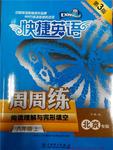题目内容
【题目】
Roberta appeared on the stage. She took a deep breath and began to 【1】 . Now she was Portia, a strong-willed 【2】 in Shakespeare's The Merchant of Venice. The theater was filled with people. She was speaking with a power she had never before experienced, the words flowing 【3】 from her. 【4】 ,Roberta had never acted in her life before the audition(选拔试演). She 【5】 being in front of other people. She was very 【6】 at school. She had never thought she was good enough at anything to 【7】 much attention. She stayed mostly to herself, making 【8】 friends. She had excellent grades, 【9】 she always thought that something was missing.
Two weeks before the audition, Roberta's mother had heard about it and _ 【10】 her to join in.
“I can't think of anyone else better suited to 【11】 the part. Remember all the plays you used to act out for us?" Roberta looked down. “I’m not interested.” Her mother wouldn't let the 【12】 drop. " You're just a little scared(害怕). Everyone gets scared. You know you 【13】 do it. The trick is to look past the 【14】 to find the love of what you're doing. "
So Roberta had made an appointment(预约)with the head of the Drama Club. She had read the play and found herself excited by the 【15】 of speaking such rich words. In secret she practiced Portia's part, 【16】 the lines by repeating them over and over. It wasn't hard, she 【17】 every minute of it. Every time she spoke the words, she had a new 【18】 of the lines, as if Shakespeare had written Portia on many levels.
On the day of the audition, she 【19】 two of Portia's famous speeches for the auditors. When she had finished, the head of the Drama Club announced the 【20】 was hers.
A. singB. danceC. speak D. report
A. memberB. actressC. player D. character
A. weaklyB. rapidlyC. smoothlyD. slowly
A. At firstB. In factC. After allD. In all
A. hatedB. enjoyedC. appreciatedD. regretted
A. honestB. shyC. polite D. patient
A. avoidB. focusC. pay D. attract
A. fewB. a fewC. several D. many
A. orB. soC. for D. but
A. forcedB. requestedC. encouragedD. reminded
A. acceptB. playC. offer D. learn
A. roleB. matterC. interestD. grade
A. canB. mustC. may D. should
A. angerB. painC. sadness D. fear
A. purposeB. wayC. ideaD. importance
A. memorizingB. organizing C. checking D. improving
A. disliked B. loved C. expected D. bore
A.consideration B. Description C. selectionD. understanding
A. practicedB. plannedC. performedD. delivered
A. partB. playC. speech D. Position
【答案】【1】C
【2】D
【3】C
【4】B
【5】A
【6】B
【7】D
【8】A
【9】D
【10】C
【11】B
【12】B
【13】A
【14】D
【15】C
【16】A
【17】B
【18】D
【19】C
【20】A
【解析】【1】据后文得知文章的主人公站在舞台上表演的是话剧《威尼斯商人》,话剧的台词需要开口 “说”,不是“唱”,不是“舞”,更不是“报告,报道”,故选C。另外,She was speaking with a power. . . 也能提示答案。
【2】文中交代,现在她是Portia, Portia是戏剧《威尼斯商人》中的一个“人物”。这里一定要注意介词短语" in Shakespeare's The Merchant of Venice " 在句中作所选名词的定语,所以不能选member (成员)。注意:Portia不是actress(女演员),更不是player(选手,表演者),故选D。
【3】 由 She was speaking with a power she had never before experienced. . . (她的话语之中带有一种她以前从未有过的力量……)可知她应是“流畅地,顺畅地”说出台词。故选C。
【4】上文已交代,她在舞台上表现出色,下文又说她在选拔试演之前从来没有演过戏,因此应选in fact (实际上)。at first意为“起先”;after all(毕竟)和in all(合计)皆不合题意,故选B。
【5】前句说她从来没有演过戏,后文说她认为自己不擅长做引人关注的事情,因此,她应该“讨厌” 在众人面前表现。其他三项都不符合题意。故选A。
【6】 根据上文" She hated being in front of other people " 可知,她在学校里是腼腆的,在这个情景下涉及不到“诚实,礼貌以及耐心”方面的内容,故选B。
【7】前文说,她不喜欢在众人面前表现,又腼腆,她认为自己不擅长能够“吸引”众人注意的事情,avoid(避开)和focus(聚集,集中)均与题意不符,当然这里也不用pay, 故选D。
【8】根据前半句She stayed mostly to herself(她多数时候总是独自一人待着)可知她“很少”交朋友,我们必须结合上下文来确定答案。few意为“很少的,几乎没有的”;a few表肯定,“几个”;several意为“几个,数个”,故选A。
【9】比较一下前后分句所表达的意思,便可得到正确的答案,前一个分句中" She had excellent grades " 意为“她成绩出色”后一个分句中" she always thought something was missing " 意为“她总以为丢失了某种东西”,前后句之间存在转折关系,故选D。
【10】妈妈听说了选拔试演的事情,对于这个腼腆又缺乏自信心的女儿,妈妈当然会“鼓励”她去报名了。force意为“迫使”;request意为“请求,要求”;remind意为“提醒”,均不符合题意。故选C。
【11】此句意为:“我”想不出任何别的更加适合“扮演”这个角色的人了。故选B。
【12】 let the matter drop意为“放弃这件事”,在此文中妈妈鼓励她参加选拔,她表示没有兴趣,但她妈妈不想让此事就此结束。故选B。
【13】情态动词can在此表示“能,有能力”。其他三项都不合题意,故选A。
【14】妈妈已经看出女儿不想参加选拔预演的原因是有“恐惧”心理,她教女儿的技巧Portia. 是等去寻找对所做事情的热爱。故选D。
【15】 此句中 found herself excited by the idea of speaking such rich words意为“想到要说如此丰富的台词,她便觉得兴奋”。故选C。
【16】前半句的意思为“她悄悄地练习着Portia的角色”,又通过“一遍一遍地重复”可知,应是“记忆”台词(lines),故选A.
【17】love/enjoy every minute (of sth.)意为“每分钟都过得愉快”,如:1 have enjoyed every minute of my stay here. 在此逗留的每一分钟我都感到很愉快。It was a sunny day and I enjoyed every minute of the run. 在这阳光明媚的日子里,我尽情享受着慢跑的每一分钟。
【18】 根据后半句 as if Shakespeare had written Portia on many levels. (好像莎翁在很多不同层次上描写了 Portia这个人物。)我们可以看出,她每读一遍台词,都会有新的“理解”(understanding),而不是“考虑”(consideration)或者“描写”(description),更不是“挑选”(selection),故选 D。
【19】在选拔试演那一天她为评委们“表演”了两段Portia的著名台词(speech)。故选C。
【20】这个“角色”是她的了。因为她争取的是Portia这个角色而不是这部“戏”、“台词”或者“职位”。故选A。

 快捷英语周周练系列答案
快捷英语周周练系列答案